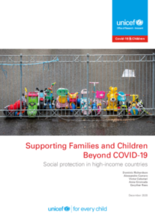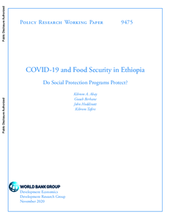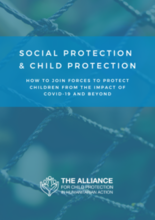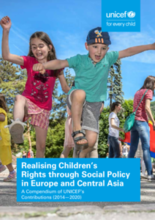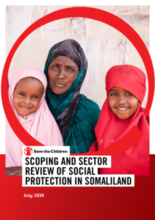Displaying 51 - 60 of 461
This new UNICEF Innocenti report explores how the social and economic impact of the pandemic is likely to affect children; the initial government responses to the crisis; and how future public policies could be optimized to better support children.
This paper assesses the impact of Ethiopia's flagship social protection program, the Productive Safety Net Program on the adverse impacts of the COVID-19 pandemic on the food and nutrition security of households, mothers, and children.
This study provides evidence from an evaluation of a bespoke family strengthening intervention for Child Support Grant beneficiaries in 10 urban communities in Johannesburg, South Africa.
The objective of this guidance is to lay out key arguments for close collaboration across Social Protection and Child Protection to address the socio-economic impact of COVID-19 on children and families towards reduction of adverse Child Protection outcomes.
This Russian language Compendium documents UNICEF’s social policy interventions in Europe and Central Asia from 2014-2020 and includes 18 case studies from 15 different countries as well as stories from the field.
This Compendium documents UNICEF’s social policy interventions in Europe and Central Asia from 2014-2020 and includes 18 case studies from 15 different countries as well as stories from the field.
This literature review examined the extent to which the US child welfare system acts as an informal income maintenance programme.
This paper investigates whether the Government of Zimbabwe’s Harmonized Social Cash Transfer (HSCT) Program, which combines cash transfers with complementary services, affects youth exposure to physical violence.
This Scoping Study and Sector Review, produced under the guidance of the Ministry of Employment, Social Affairs and Family (MESAF) of Somaliland and Save the Children, is a strategic analysis of the existing policy landscape in Somaliland in order to inform the development of a Social Protection system.
The main purpose of the follow-up evaluation was to assess first, whether participants in the Sihleng’imizi Family Strengthening programmes had retained what they had learned and were able to implement these learnings nine months following termination of the intervention; second, to compare these findings with the control group that had not been exposed to the programme; and finally, to consider the policy implications of combining cash transfers with family care programmes.

